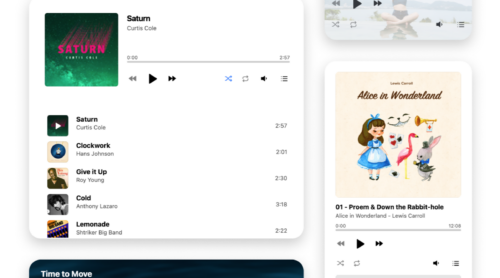Add Facebook Reviews to Your Website Using Elfsight Widget
With the Facebook Reviews widget, you can effortlessly display Facebook reviews on your website without requiring any coding expertise. This widget is a straightforward solution that allows you to showcase customer feedback with a visual editor, where you can personalize the colors, fonts, and toggle on/off any display elements.
Embedding Facebook reviews on your website is a quick process that can be completed in just 2 minutes. To do so, follow these steps:
- Create a free account with the Facebook widget provider.
- Choose your preferred template and save the widget for Facebook Reviews.
- Copy the installation code and add it to your website at the desired location.
Isn’t it fantastic? Additionally, you can try displaying a Facebook plugin using a free, interactive online demo.
You can explore all of the features without signing up and unleash your imagination for free!
Step-by-Step Guide: How to Add Facebook Reviews to Your Website with a Widget
If you are looking to enrich your website or blog with customer feedback from Facebook, then the Facebook Reviews widget is a must-have plugin. Once you have personalized the display to suit your preferences, the next step is to embed it on your web pages. The process is easy and swift, and you can incorporate the Facebook Reviews widget into any HTML field, regardless of the web platform you are using.
Using the Facebook widget, you can enjoy numerous benefits, including:
- Displaying Facebook reviews for free, with unrestricted review functionality.
- Customizing the design and template using the user-friendly admin panel. No need to make modifications to the platform code.
- Automatic updates and additions to your Facebook reviews, ensuring that your website is always up-to-date with the latest customer feedback.
To embed the Facebook widget on your website, follow these straightforward steps:
- Sign in to your widget provider’s admin panel.
- Create, customize, and configure your Facebook Reviews widget.
- Save your widget.
- Copy the installation code.
- Embed the code into the HTML field on your website’s backend.
That’s it! Now you can enjoy the advantages of the Facebook Reviews widget on your website or blog, and enhance your audience’s experience with amazing Facebook reviews.
It’s effortless to embed a Facebook widget on your website using the Facebook Reviews widget offered by Elfsight. Whether you use the default website editor or prefer Elementor, you have two options to add the widget.
Option 1: Through the website editor
To display Facebook reviews on your website, create and customize the Elfsight Facebook Reviews widget in the admin panel. Then, copy the installation code and paste it into the HTML field of your website’s admin panel. Follow these steps:
- Create the Elfsight Facebook Reviews widget in the admin panel.
- Copy the installation code.
- Log in to your website account.
- Go to the ‘Pages’ section and choose the page where you want to display the widget.
- Add a custom HTML block to the desired part of the web page.
- Insert the Elfsight Facebook Reviews code into this block, which you generated in the code generator.
- Click ‘Update’ to save the changes.
You can modify the reviews in the Elfsight panel, and they’ll be displayed in the widget on your website. You don’t need to make any changes to your website’s HTML code.
Option 2: Through Elementor
If you prefer a visual editor like Elementor, you can quickly add the Elfsight Facebook Reviews widget to your website. Here’s how:
- Create the Elfsight Facebook Reviews widget for free in the admin panel and save it.
- Copy the installation code.
- In your website’s admin dashboard, choose the desired page.
- Select ‘Edit with Elementor’ either from the page list or the WordPress page manager.
- Drag the ‘HTML’ element to the area of the page where you want to add the Facebook Reviews widget.
- Insert the Elfsight Facebook Reviews code into this element, which you generated in the code generator.
- Click ‘Update’ to save the changes in both Elementor and WordPress.
You can repeat this process for each page where you want to display the Facebook Reviews widget, and it will be displayed on your website immediately. With the Elfsight Facebook Reviews widget, you can showcase Facebook reviews on your website and gain the trust of potential customers.
Here are the steps to add Elfsight Facebook Reviews to your Squarespace website:
- Create, customize, and save the Facebook plugin on Elfsight.com.
- Copy the installation code provided by the widget.
- Log in to your website’s admin panel.
- Open the page where you want to display the Facebook Reviews.
- Insert an HTML code block on the page.
- Paste the copied installation code into the code block.
- Save and preview the page.
Your website will now display the Facebook Reviews, and you can start showcasing your customer feedback. With Elfsight Facebook Reviews, you can customize the design and functionality of the display using the plugin’s admin panel. The plugin is free to use, and any changes you make in the admin panel will be instantly reflected on your website. You can even integrate it with your Facebook page to display reviews from your social media page. Elevate your website’s customer experience with Elfsight Facebook Reviews.
Elfsight Facebook Reviews is a remarkable plugin that can be integrated into any website to enhance customer trust. As an online business owner, you understand the significance of building customer confidence. Here’s what you need to do in order to integrate it to Shopify website:
- Create and personalize your Facebook plugin for free on Elfsight.com.
- Copy the widget’s installation code.
- Sign in to your website’s admin panel.
- Navigate to the webpage where you want to add the Facebook Reviews display.
- Insert an HTML code block on the page.
- Paste the copied installation code into the code block.
- Save and preview the page.
Your Facebook Reviews display will be visible on your website, and you can begin showcasing your customer reviews. You can adjust the display’s design and functionality using the plugin’s admin panel. It’s free to use, and any modifications you make in the admin panel will be applied to your website instantly. You can even connect it to your Facebook account to display reviews from your page. Get ready to take your website’s customer experience to the next level with Elfsight Facebook Reviews.
The most remarkable use cases of Elfsight Facebook Reviews
Now that you know how to embed the Facebook widget on your website, the next step is to arrange it properly. This can be a bit challenging for those who are using the widget for the first time. But worry not, we have compiled some awesome examples of how the review widget can be displayed on your website. These examples showcase the most popular use cases, so you can find something useful for yourself. Best of all, this widget is completely free to use.
Review Request
On this website, you can embed a Facebook Reviews widget that displays customer reviews in a clean format with the original Facebook color scheme. The widget includes a header that shows the overall rating of the page and the number of reviewers, along with clickable images of the latest reviewers. You can also offer a review-request button that encourages customers to leave a new review, with the “Yes” option highlighted in blue to grab attention. Best of all, this widget is available for free!
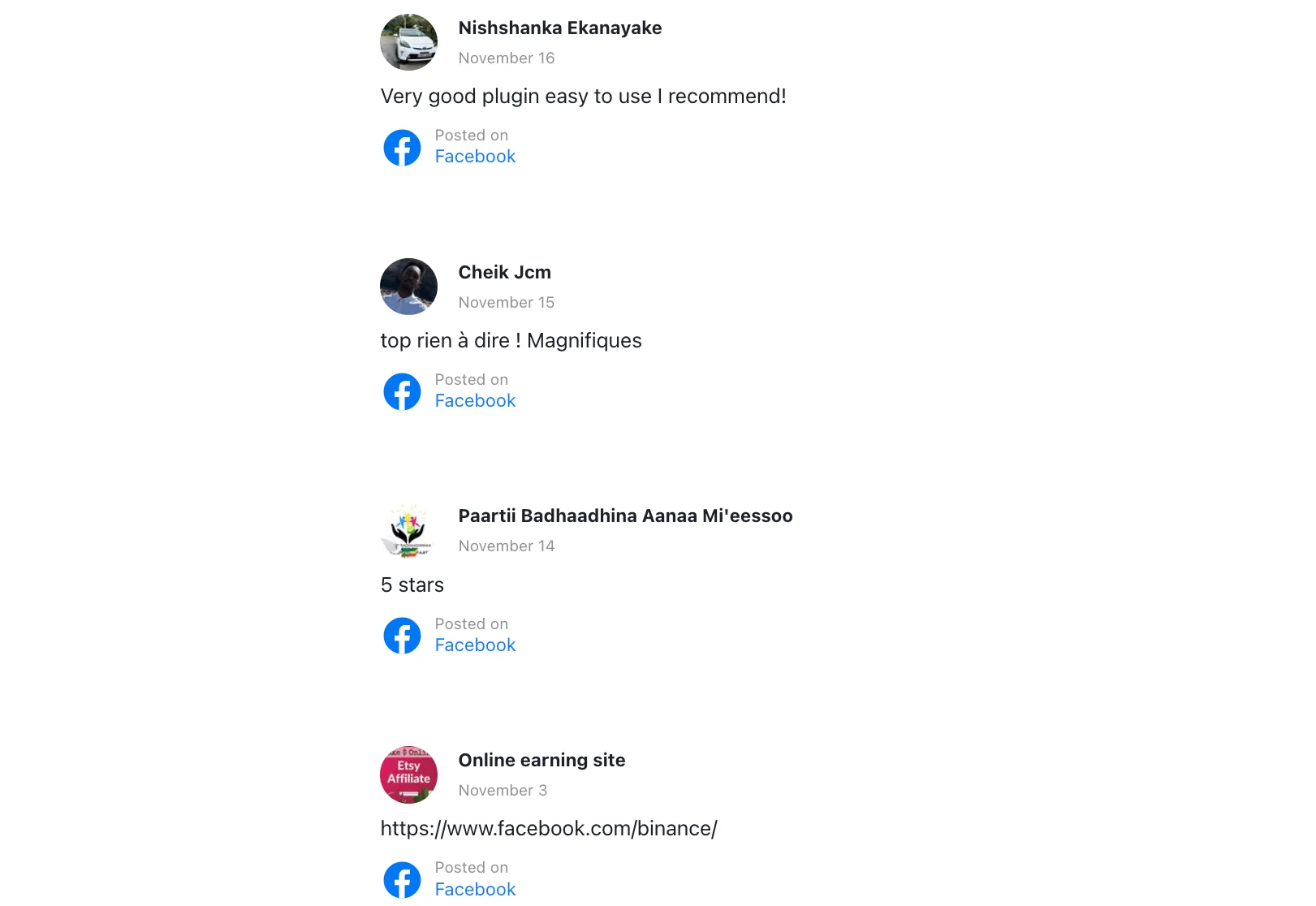
Reviews List
You have the flexibility to embed your Facebook reviews into your website as a neat and concise list. By removing the header and enabling the Auto width and height options, the widget can effortlessly adapt to the available space on the page and appear as a natural part of it. Furthermore, you have the option to apply filters to control the number of displayed reviews, exhibit only the positive ones, or remove unwanted reviews by using specific keywords.
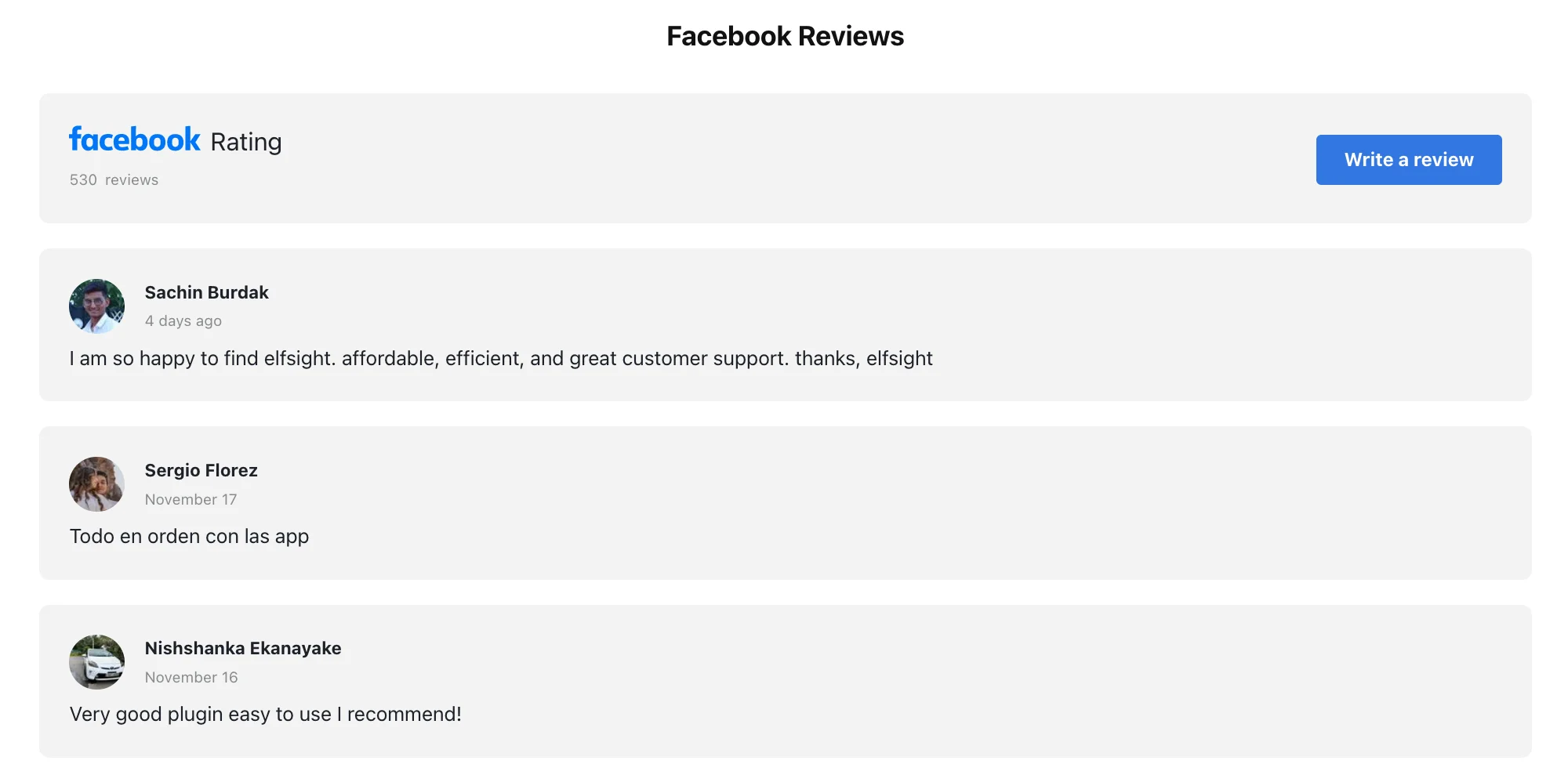
Reviews Masonry
This particular Facebook plugin showcases a grid of reviews displayed in a Masonry layout that automatically optimizes the placement of reviews based on their height. The use of custom colors gives the widget a distinctive appearance, while the star rating provides an instant visual indicator of high customer satisfaction. The plugin can be easily embedded on any website for free, providing a great way to display Facebook reviews and boost customer trust.
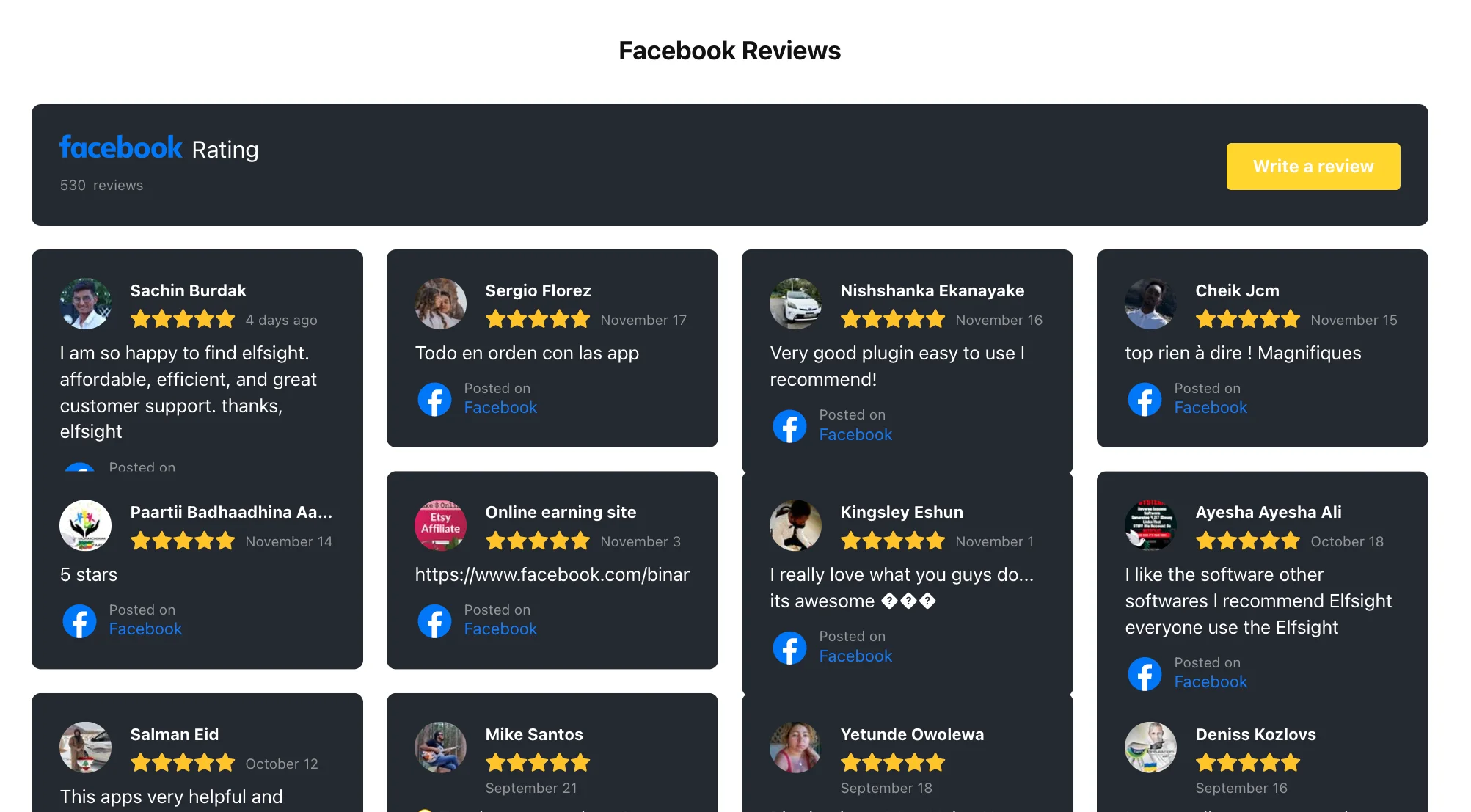
Reviews Grid
The widget displayed on this website page features the perfect combination of the Grid layout and Spotlight review template. With its minimalistic design, the widget catches the eye with straight lines and center-aligned review texts. This is an ideal choice for those who want to keep their webpage elegant and stylish while showcasing their reviews. The clean geometry of the Grid layout ensures that it blends perfectly with any other review template, giving you the freedom to choose. Best of all, this plugin is available for free, making it a great choice for any website owner.
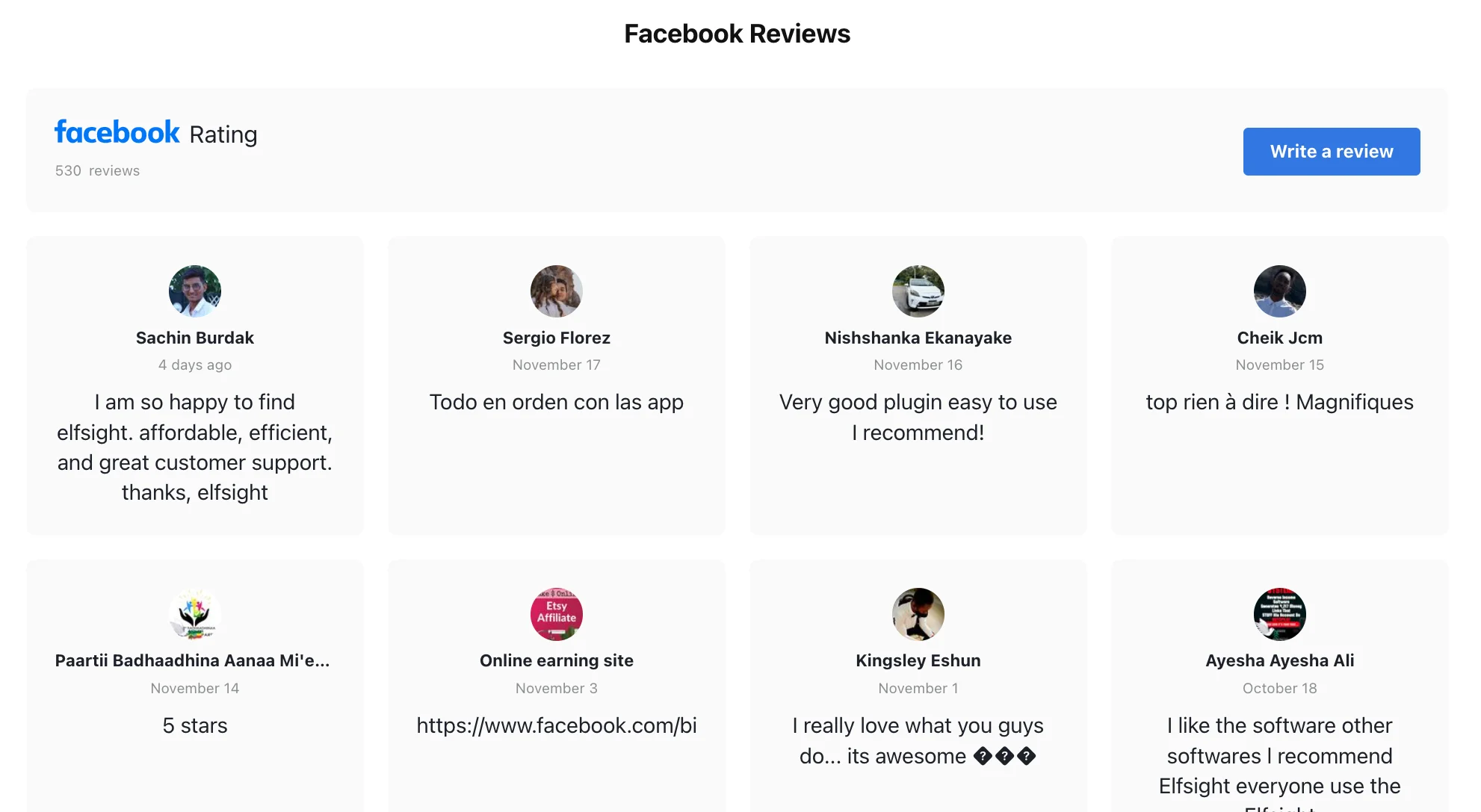
Facebook Reviews Plugin Remarkable Features
By utilizing Elfsight Facebook plugin, you can benefit from a range of features that enhance the process of embedding reviews to your website. This Review widget is responsive and code-free, which makes it simple to create using a visual editor and add it to your website. The main features of this free plugin can be found in the table below.
| Swift Integration |
|
| Filters |
|
| Review Sorting |
|
| Layout |
|
| Header |
|
| Review Style |
|
| Design |
|
Conclusion
Ratings and reviews have become a vital component of any successful online presence. Integrating customer feedback into popular search engines such as seller ratings can boost SEO and drive more traffic to your website. Even negative reviews can be a valuable tool for businesses to improve their products and services.
It’s essential to keep tabs on your Facebook reviews and engage with your audience regularly. Larger companies may even have dedicated teams to manage their online reputation by responding to and adding reviews to their website. However, review aggregation services are also available to help streamline this process and save on the salaries of content managers.
Customer reviews on your website can add great value to your business. They not only boost consumer confidence in your brand and products but also increase your online visibility, ultimately leading to higher sales. Consider adding a reviews plugin or embedding them into your website for free to make it easy for your customers to leave feedback and share their experiences with others.






